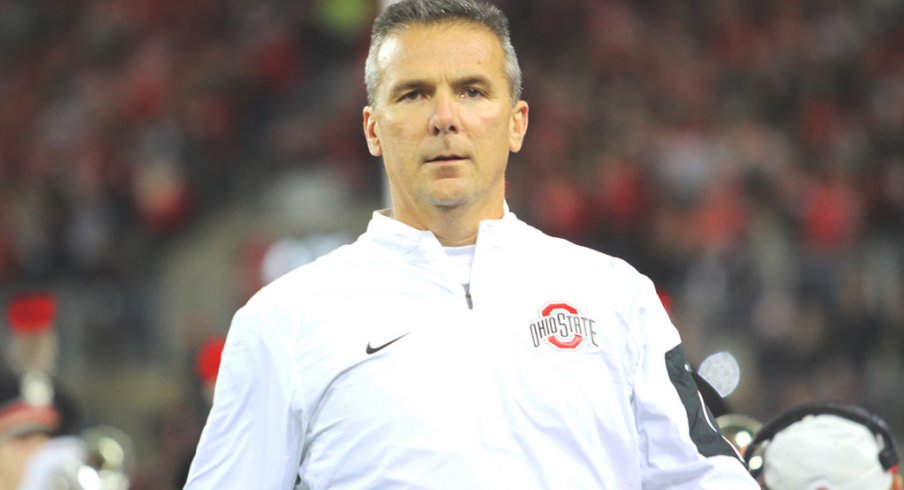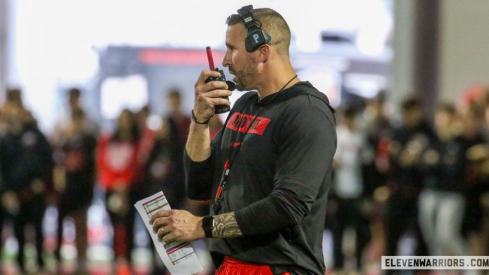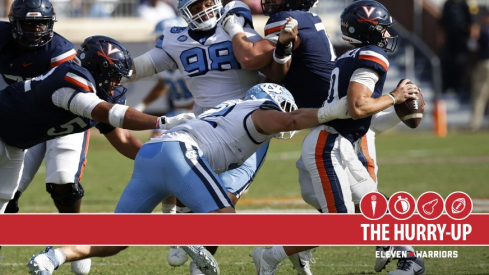A pair of NCAA recruiting rules with regards to text messages and satellite football camps has Ohio State's Urban Meyer perturbed.
The governing body of college sports decided Friday that camps where coaches from other schools could attend to see high school players in different cities and states were no more, effective immediately. It also halted the regulation of text messages between coaches and recruits, meaning a high school player can now receive however many messages coaches want to send them, at all hours of the day.
"The texting thing is the most ignorant thing I've ever heard in my life," Meyer said Monday. "Because they can't manage the coaches, they can't police the coaches. Fire the coaches that do it. Fire them. And make the penalty so absolutely out of control that they won't do it. (Make it so) you'll never coach again in major college football if you on purpose text someone."
Satellite camps often provide an opportunity for less heralded recruits to be noticed by non-Power 5 conferences and potentially earn a scholarship for their future. For example, a recruit from Columbus might not be able to afford the necessary travel expenses to participate in a camp in West Virginia. Instead, coaches can travel to Columbus and see players work out that won't earn an offer from the Buckeyes.
Meyer did not know that portion of the new rule in particular, which is the source of his beef with the decision.
"I just hate to see it," Meyer said. "Probably hundreds of scholarships come out of here to those young players and I know my son is getting recruited a little bit so what camps do you send them to? Not many kids can play at Ohio State so don't send them or send them but ... Now Bowling Green won't have a chance to watch him play."
“I'm talking about there's a big chunk of players out there that deserve to play major college football. I think they'll, I hope they'll revisit it. I'm not saying it's right or wrong, because I don't really know about it.”– Urban Meyer
Meyer started his career in Bowling Green and took advantage of the old rule, he said. Both years he coached the Falcons, he and his staff made the two-hour drive to Columbus to see Central Ohio players and potentially offer scholarships.
"When I was at Bowling Green it was 'Come to Ohio State's campus to see all these players,'" Meyer said. "I didn't realize that was part of the conversation. I wish they'd revisit that part of it. Once again, sometimes I think there's knee-jerk reactions from people complaining and all that and I get that. I think it's a slippery slope.
"I'm not worried about the high-, high-level players, because they're going to get where they need to get. I'm talking about there's a big chunk of players out there that deserve to play major college football. I think they'll, I hope they'll revisit it. I'm not saying it's right or wrong, because I don't really know about it."
Meyer's voice carries significant weight across the college football landscape, and it's not the first time he has used it to express his opinions and look for change from the NCAA. The Ohio State coach took a stand when his team made the first-ever College Football Playoff in December 2014, publicly commenting about how the families of players on his team should receive financial aid to travel to both New Orleans for the Sugar Bowl against Alabama and National Championship in Dallas against Oregon.
"My question was why wasn't that done when they first brought up the College Football Playoff?" Meyer said. "Whoever has that checklist, No. 1: Student-athlete. Then all the other stuff. Building facilities, salaries, the commissioner's grandchildren get to go to the championship games or not because they all do. But you're telling me the backup tight end's family can't go? It's just common sense. But why isn't that the No. 1 thing?"
Meyer wishes the NCAA would put student-athletes on subcommittees to see how they feel about certain rules like unlimited texting among recruits or nixing satellite camps. He said he comments were not "anti-NCAA," but hopes it reconsiders its recent decisions.
"I think they need to revisit this because I did see some good stories, I read about the kid that never got a shot to play but he went to ... because he can't afford the camp," Meyer said. "Everything is on the player's dime right now. It's going to be interesting how they keep revisiting that."
Will Meyer continue to push for a change in the policy? He's not sure yet.
"Once we get through spring football then we might decide. But we’ve gotta get ready for Wednesday’s practice," Meyer said. "I hope they reconsider. I hope after an article one of you guys does maybe they’ll call and ask our opinion."


